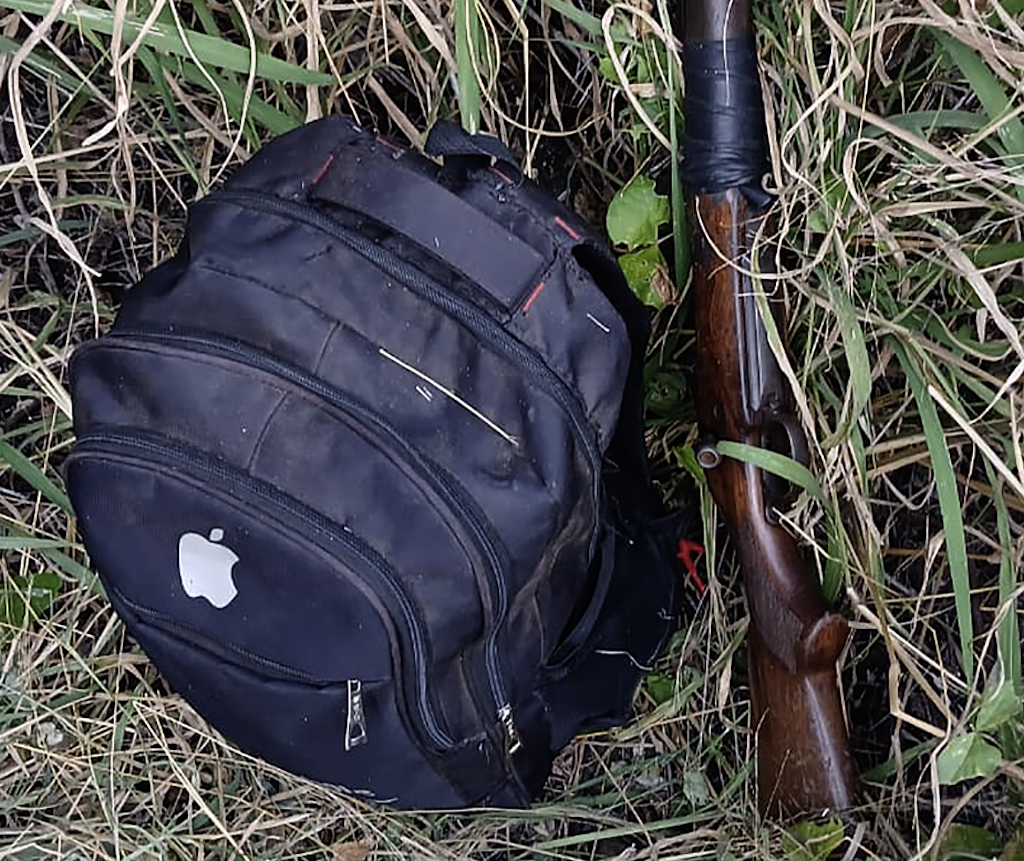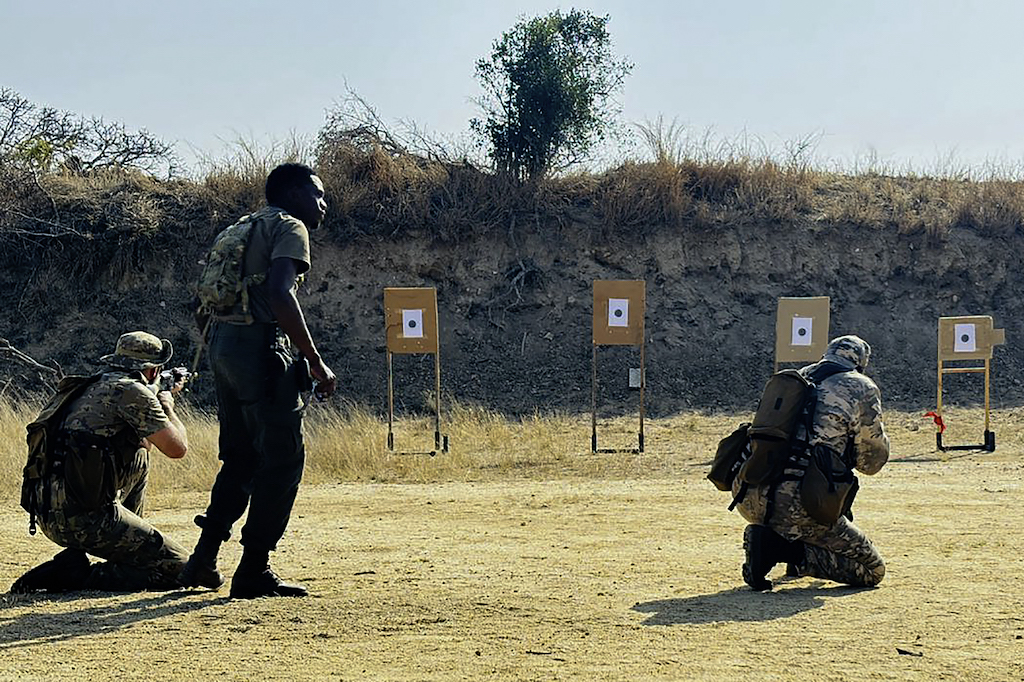
09 Jun Poachers’ partners: When Kruger’s rangers turn rogue
Insiders describe why, and how, rangers sworn to protect wildlife collude with poaching syndicates slaughtering rhinos. Tulani Ngwenya investigates

On guard: Former ranger trainer Hendrick Sithembiso carves through dry wood with twin tactical knives, demonstrating ‘bushcraft’ to students during an advanced training programme in Kruger in 2024. Photo supplied
Despite integrity tests and modern surveillance technology, insiders at the Kruger National Park reveal that corruption persists systemically, fuelled by poverty wages, predatory debt cycles, and communal ties binding rogue rangers to syndicates.
After months of building trust, Oxpeckers gained exclusive access to information from four people who have witnessed firsthand the dark realities of the illegal connections and how they operate. They described a world where financial pressure, coercion and broken systems converge to push even well-intentioned rangers into the orbit of rhino-poaching syndicates.
Melusi*, a mid-level Kruger manager involved in anti-poaching operations and coordination, chose to remain anonymous because he said exposing corruption in the “broken system” can lead to serious risks.
According to him, ranger collusion with rhino poaching syndicates isn’t the work of a few bad apples. “It’s embedded, and systemic,” he said.
It’s also driven by desperation: “Rangers earn low salaries. They call us heroes but pay us like traitors.”
As a result, rangers often take on debts that can turn them into syndicate assets. “They borrow from loan sharks and give up their ID books or ATM cards as collateral. Some sell out just to clear their debts and reclaim their documents.”

Field evidence: A high-powered rifle (.375 H&H Magnum) and a black bag with tools of poaching seized from a 47-year-old Mozambican national who was arrested in Kruger’s Xitsalaleni Block for illegal hunting and trespassing on May 12 2025. Photograph courtesy South African Police Services
Social media
The syndicates don’t randomly recruit collaborators, he said. “They monitor you. They track your social media and follow your movements. A beer at a soccer match turns into a recruitment attempt. And if you say no? Your wife gets a call. Your brother’s goats get slaughtered. That’s the level of coercion we’re dealing with.”
He recounted the experience of a ranger who was offered a large amount of cash, stuffed in a black plastic bag, in exchange for his battered car. “He refused, but they followed him for days. Not everyone walks away untouched.”
“These individuals are not only vulnerable, they are under pressure. Once they accept that first bribe, it’s a chain reaction. One thing leads to another.”
He said rangers are sometimes recruited while they are participating in game drives in the park. Other times, the recruiters use sex workers at taverns, then blackmail the rangers caught in compromising positions.
Asked about surveillance systems and security platforms put in place to prevent rhino poaching, Melusi* responded: “If personnel manning those stations are infiltrated, what happens?” The poachers use burner phones and old-school SMSes to avoid digital tracking, he added.
For him, the core problems are clear: “It’s the human element, poor oversight and no real consequences.”

Bloody target: Wildlife Forensics Academy students conduct a simulated ballistics exam during training critical for piecing together firearm evidence in the fight against rhino poaching. Photo courtesy Wildlife Forensics Academy
The insider who walked away
Zwane*, a former SANParks ranger from Bushbuckridge, chose to remain anonymous due to the sensitive information he shared. He worked for three years in the southern sections of the Kruger before leaving to work with various private organisations in Limpopo, including the Protrack Anti-Poaching Unit.
“While I was active in the private sector, cellphones were prohibited during operations,” he said, “but the corrupt ones always carried theirs. It was a pattern; they would pretend to take pictures or scroll, but they were passing information to syndicates.”
He explained that bribes usually came in small denominations: R50s, R100s, and R200s, often in large volumes. “You won’t see the handover. But suddenly a guy’s buying rounds of drinks at the tavern, dropping R1,000 like it’s nothing. You can’t do that on a ranger’s salary. There’s always a pattern to the payments.”
When asked why rangers would risk everything, he said: “It was always about money. They were not satisfied with the working conditions. The bribes? That’s more money than you’ll ever earn legally.”
Some rangers are co-opted because of their family relations to rhino poaching syndicate members, he added. ‘If you’re from the same village as the syndicate and they test you with money, you might give in. It’s not always greed. Sometimes it’s just survival.”
He said some poachers get their firearms with the help of their superiors and outside officials. “These guys are clever. They get assistance from ex-police, ex-soldiers, and even senior park staff. It’s a network.”
His departure from the wildlife sector came after disillusionment set in: “Yes, I left partly because of what I saw. But also, they weren’t paying fairly. Salaries were based on skin colour; white staff were paid more than black staff for the same work. That’s why I walked.”

Sharp focus: Hendrick Sithembiso instructs field rangers during a 14-day training exercise at the Southern African Wildlife College in August 2024. Photo supplied
Ranger trainer
Hendrick Sithembiso, a former field ranger trainer at the Southern Africa Wildlife College within Kruger National Park, advocates for a rotational system among anti-poaching teams to prevent infiltration.
“Working in a community where people know you makes many rangers commit corruption. You may see a poacher when you chase and catch him and find out he is one of your relatives,” Sithembiso said. “Rangers should be deployed away from their communities of origin.”
“Usually, no poachers will enter the parks without an inside accomplice or inside knowledge, as most poaching is an inside job. It’s often that rhino poachers are ex-military, former rangers, and even ex-police members who are well-trained and know how to operate and stay in the bush for several days without being detected.”
He also highlighted that the use of mobile phones while on duty was one way information was either intercepted or shared with rhino poaching syndicates, as many rangers have their phones while on duty. “Using mobile phones while on duty facilitates information leaks to syndicates. Rangers should instead use radios for communication.”
Kruger’s Integrity Management Plan
Thobile Zulu-Molobi, spokesperson for Dion George, Minister of Forestry, Fisheries and the Environment, responded that the Kruger is rolling out a Ranger Services Integrity Management Plan to address drivers of misconduct, including corruption.
Developed in 2023, the plan has “four strategic actions that address all the priorities you mention,” she said. These actions include “improving professionalism, motivation and trust by embedding core values, key attributes and skills development”.
The plan aims to establish a transparent and fair integrity testing system, and to strengthen anti-corruption investigations and prosecution support. Ranger remuneration, career progression, mental health and physical well-being are also being addressed, Zulu-Molobi said.
“Fostering of trust is an ongoing process that involves a lot of activities, meetings and workshops. Assessment is done on integrity, honesty and the physical ability plus pride to work for the organisation,” said Kruger spokesperson Isaac Phaahla.
“We continue to address members of staff on ethical, honest and dedicated service; in the end, it is an individual who decides… against being lured into criminality.”
In response to the concerns raised that low pay and debt make rangers vulnerable to bribery, Phaahla said: “Salary scales are subjective; we need to cut our cloth according to what we earn; no one has ever been happy with their salary. The rangers are paid competitive wages but as you know money is finite, and budget restrictions present a challenge to meeting people’s expectations.”
Regarding the reported abuse of personal phones during patrols, and whether a no-phones-on-duty policy should be applied, Phaahla said: “We must abide by the country’s labour laws as a guide. There is nowhere where it is suggested that we should keep phones of employees.”

Hard job: Ranger trainees pose deep in the Kruger bush, capturing a moment of unity during a ‘ranger live-saver’ drill in June 2024. Photo supplied
Honest rangers
An active Kruger ranger who asked to remain anonymous because he was not authorised to speak to the media pointed out that honest rangers are doing the best they can in very harsh conditions, and their efforts often go unnoticed.
He said their work is being undermined by rangers with “weak minds. They [the syndicates] start by identifying people within a group who are weak and they target them personally. That is where the problem starts, and that is why awareness and education are needed.”
Asked how the narrative of rangers being called “warriors” and their efforts to end rhino poaching as “war” made him feel, he said: “I believe in fighting for future generations. We need to protect our natural resources, and the national park as a whole represents the heritage of the entire country. We do not want something to go extinct.”
“It feels good being a warrior, fighting for what you believe in, fighting for something that will provide for your family even if you are gone; it will stay here because that is what we are trying to do. We need to be recognised as soldiers.”
He concluded by saying, “We need to be recognised for doing a hard job every day; our risks are very high every day; whenever you go [to work], you know that you are at high risk and that needs to be recognised in order to curb transgressors.”
* Names withheld
This investigation was produced with support from the Southern Africa Accountability Journalism Project (SA | AJP), a partnership between the Henry Nxumalo Foundation, Oxpeckers Investigative Environmental Journalism and Viewfinder Centre for Accountability Journalism. It was funded by the European Union. Its contents are the sole responsibility of SA / AJP, and do not necessarily reflect the views of the European Union.
• Track information on wildlife and other environmental crimes across the globe on the Oxpeckers #WildEye tool
